BILD: Med röd inramning.
SINGER, COMPOSER, LECTURER
WRITER & ACTIVIST.
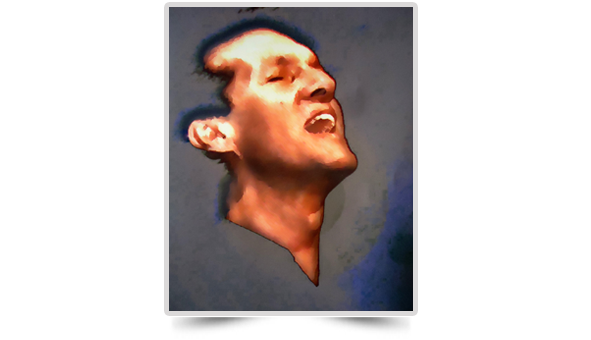
His song and his extraordinary musicians and his Roma tunes from different parts of the world has achieved a lot of attention in Sweden and in other countries.
Theirs intense and joyful songs and music, full of passion and rhythm make success everywhere they appear.
Caldaras has a fantastic power on stage. He knows well how to spell-bound his audience with his expressive voice. No-one is left untouched.
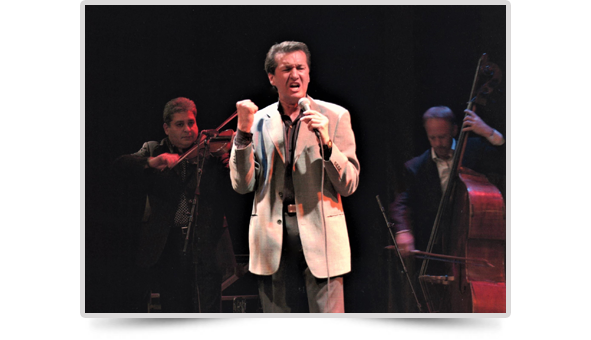
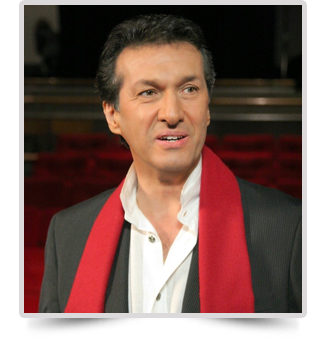
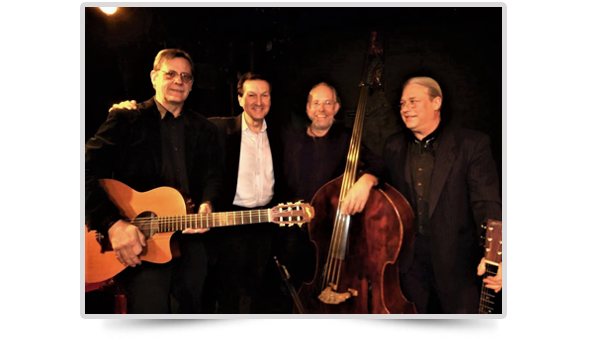
His long career as a professional artist has rendered him a faithful audience since he started to work as professionell artist 1967, when he made his debut on record and in TV.
Hans Caldaras, born in Stockholm-Sweden, has historical roots in India, Romania and Russia, and belonging to the ethnic group ”Rom”. (Kalderash)
His reputation as a popular music artist in a swedish TV-serie resulted in a recording contract. The first Roma LP ”Romané Djilá” in the language Romanès in Sweden was released 1973.
Caldaras attracted attention, appeared on TV, and have maintained an extensive tour activity throughout the years. He knows what the word entertainment means.
Caldaras has done almost everything as an artist since his debut on stage at six. Thousands ofconcerts, musicals, theatre plays, festivals, many records and a variety of radio and television appearancies.
THE ROMA HOT BAND
The orchestra consists of a very skillful musicians. The repertoire is roma music with influences from improvised jazz, latin and ”gypsy” swing of Django Reinhardt.
The violin-player Emilio Estrada from Cuba has played in the group since 1996, the guitarist Christer Langborn and Anders Sjöberg has cooperated with Caldaras more then thirty years and the bass player Hasse Larson since 2000.
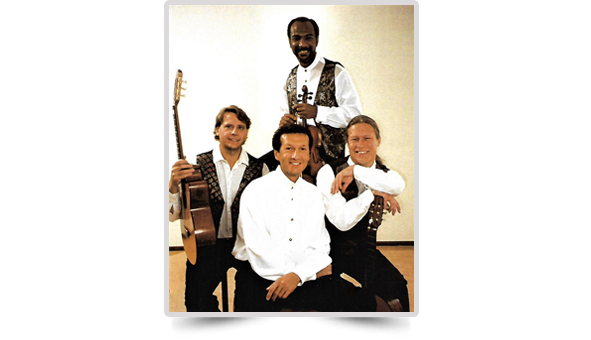 Caldaras and ”The Roma Hot Band” go directly to the heart. They have allways achived a success with their lively performances. Caldaras and ”The Roma Hot Band” go directly to the heart. They have allways achived a success with their lively performances.
THE ALEXANDRU BAND
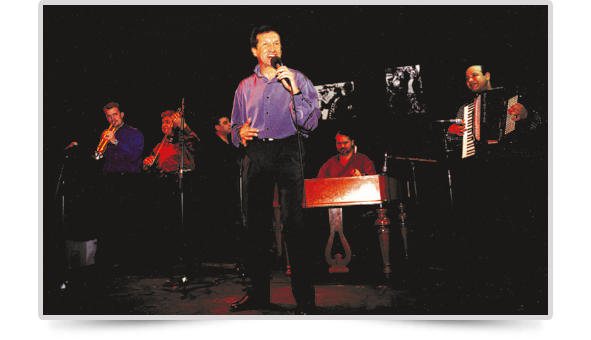
Since 1998 Caldaras has cooperated with the Rumanians most distinguished and popular Roma musicians, ”The Alexandru Band”. (Before: ”Stefan Bucur Ensemble”) Together they have given a number of successful conserts around Europe.
The leader of the group is the well known violinist Marin Alexandru who has toured throughout the world both solo and wellknown artists.
”The Alexandru Band” has touring with the famous pan-pipe player George Zamfir around Europe and in USA. They achived a great success at the Carnegiehall in New York.
With Caldaras ”The Alexandru Band” have lots of heat and power on stage.
Their performancies are full of passion, rhythm and joy.
And sometimes Marin even contributes with his expressive violin in ”The Roma Hot Band”
His CD from 1999 ”Kamav La” (I love her) with ”Stefan Bucur Ensemble” has been released in France, Belgium, Holland, Japan, Spain, Switzerland and in USA.
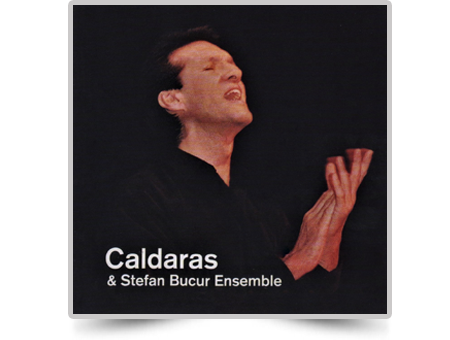
REVIEW:
”The protecting voice of the artist Caldaras -from within the snows from Nizhny-Novogorod and the Summer of Rajasthan do shiver- involves with the veils and spells of an undoubtedly flavoured artistic universe. This and his rigorous criteria the profiles of the production make this album a finished of art-work, indispensable for the lovers of profound music”.
”Generacion XX1” – Madrid – Joaquin Albaicin
EN FRANCAIS:
”Hans Caldaras, un formidable chanteur, est un rom né en Suéde. (ses ancetres venant de Russie sont passés par la Roumanie au XIX siécle), qui se consacre a la musique rom depuis de 25 ans.
Chanteur sensible et flamme ’il le faut, il interpréte d’un voix profonde et passionée, ”Johnny tu n’es pas un ange”…) et des composi-tions personnelles, ballades, complaintes ou chansons d’amour ou le tempo s’accélere souvent au fur et a mesure du morceau et ou l’on retrouve la nostalgie poignante et le romantisme propres a cette musique (cf ”Kamav la”.
Ou l’on sent un profond respect et un amour pour cet héritage. Cet exellent disque est pour vous.”
”French Guitare & Chanson” – Francis Couvreux
IN GERMAN:
”Der sänger Hans Caldaras ist Roma und wurde in Schweden geboren. Im 19ten Jahrhundert waren seine Vorfahren uber Rumänien aus Russland gekommen.
Seit mehr als 25 Jahren widmet er sich der Roma musik. Er ist en einfuhlsamer und –wennes nötig ist – feuriger Sänger.
Mit tiefer leidenschaftlicher Stimme singt er russische und rumänische traditionnelle Lieder und eigene Kompositionen.
Balladen oder Liebeslieder, in denen das Tempo im Lauf des Stuckes bergen die pakende Sehnsucht und die Romantik, die dieser Musik eigen sind.
Dann ist diese hervorragende CD genau das Richtige fur euch”.
”Die Welt” – V. Willman
____________________________________________
Caldaras latest CD ”YOY” let us enjoy traditional Roma music and non romany songs from different parts of the world, and even influence from the legend musician Django Reinhard. Caldaras lyrics are written in romanès and swedish set to roma, latin and jazz themes.

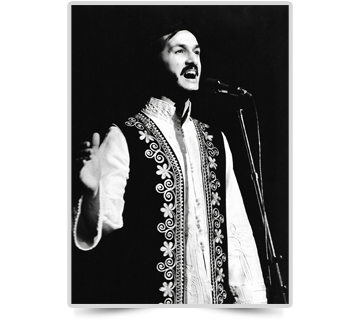
_____________________________________
HANS CALDARAS
MEMOIRS
”In the eye of the beholder”
2002: With his biography ”In the eye of the beholder” Caldaras made his debut as an author. The book received lot of attention in Swedish media.
Caldaras write about his childhood and his family in a romany camp. His ancestors history and legacy. His artistic career and engagement for human rights for the Romany people and other neglected minorities.
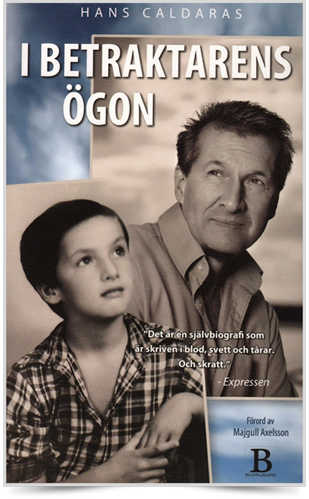
Since he began his professional career as a singer at the age of 18, he has been active in human rights for the romany people and other exposed minorities and neglected group of people. To prevent discrimination, intolerance, violience and racism has been his mission in life.
In the ”In the eye of a beholder” he also write about his romany ancesters history, culture and traditions. About his interesting and exiting artistical career and his meetings with wellknown singers, acters and politicians through the years.
2002: Hans Caldaras was elected as a member in the Swedish ”P.E.N-club.”
2004: ”In the eye of a beholder” was published in Romania.
2015: It was again published in Sweden, now with fifty new written pagesies.
2015: Caldaras was invited of the Pope Franciscus to the Vatikan, together with 10 swedish-roma activist, for an International manifestation the Pope held against rascism as antipathy and hate for the roma people in the world.
Since 2003 he has been member of some kommissions for the Swedish Government for human rights, Romany issues and against racism.
2016: He got the ”Katarina Taikon Prize” ”For his over a decade strong egagement for human rihts and work against intolerance and antiziganism / racism”
2020: Caldaras continue to work as an artist, writer and in issues of human rights for neglected minorities and not at least to eliminate intolerance and racism.
”Hans Caldaras motto in life is:
”Love always conqueror Hate”
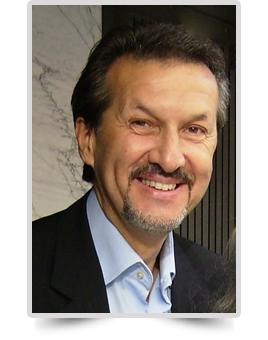
_________________________________
Written & edit by: Per Ellström. 2022
My Speech at the manifestation at Tier Garten, close to Brandeburger Tor in Berlin 2nd june 2012, to convince German politicians to raise a monument over all Roma and Ainti who was killed by nazis under the second war.
Let me begin by saying that it is a shame that we have today to convince decision-makers that the Roma and Sinti should have a place in the history regarding the fact that millions of them were annihilated and subjected to exactly the same atrocities that 6 million Jews suffered under, during Hitler’s evil ideology and reign of terror over 60 years ago.“This we must tell…” is a Swedish choice of words to remind us not to ever forget the Nazi’s depredations and evil. Each generation must take their responsibility by telling and making visible the suffering and the monstrosity that Hitler and his followers afflicted upon millions of people around Europe so that it may never happen again.
Since the end of World War II, history books, films and documentaries have repeatedly depicted the Holocaust of Jews, but not one word has been mentioned that the Roma, the Sinti and others were afflicted by the same horrific fate. It took about 40 years before the Holocaust of Roma / Sinti were made known in the media, amongst others.
Until the 1980’s, the elimination of Roma and Sinti by the Nazi’s was unknown to most of the world, and today, people react with astonishment that the Roma and the Sinti also fell victim to Nazi tyranny. Still today, there is no high-level political recognition of the Holocaust of the Roma.
At the first two-day International Holocaust Conference held by the Swedish government in Stockholm in the year 2000, the holocaust of the Roma and the Sinti was not on the agenda. We were merely four Romanies out of 800 guests who were invited to participate. After vigorous protests, one of us was allowed to give a five minute speech. This, once again made it evident that the Holocaust of the Roma and the Sinti continued to be overlooked.
There is a great lack of knowledge concerning the persecution and extermination of the Roma and the Sinti of Europe. The exact number of people murdered in the Nazi concentration camps will never be clearly determined because almost all Roma and Sinti at that time were stateless and not registered. They could therefore disappear unnoticed.
It is more likely that 2 million Romanies were killed than the official figure of half a million that so often is mentioned.
It is extremely important for succeeding generations to draw attention to the Holocaust of Roma and Sinti. It is obvious that an international monument needs to be erected in memory of all those who fell victim to Hitler’s barbarism.
Therefore, I address the decision-makers so that they finally show their good-will by giving the Roma and the Sinti a monument to honor the victims and that testifies to what the face of evil can accomplish if it is allowed free rein.
But the story of the persecution of the Roma and the Sinti did not end with Hitler’s demise. Today, there is another kind of Holocaust of Roma and Sinti across Europe. Racist tendencies are gaining more and more foothold. Xenophobic parties are becoming more successful and are represented in a number of countries’ parliaments and institutions of power, putting all the blame on, amongst others, the Roma and the Sinti, for the economic crisis that now prevails in several European countries.
Even that the Roma and the Sinti don’t own Banks, Multinational companies or have any economic or political power. This is an ironic and not at least a frightening propaganda.
I would not in any way excuse or defend people who are criminal, who earn money on trafficking and use people, who lives in misery and are poor for their own interest and purpose; they must atone for their crimes and evilness, of course.
But to condemn an entire people as thieves and bandits, is in itself a criminal act and is a violation of The Geneva Convention and the current EU rules regarding Europe’s citizens; namely, that every human being has the right to be treated fairly and judged as an individual on their own merits.
Human rights and democratic values ??are being eradicated, elitism is gaining a platform and strategies are being designed to eliminate people who are regarded as less worthy and a burden to society.
The history of the vile Nazi propaganda once again makes itself reminded and the Roma and other vulnerable groups become the easy targets of people’s discontent and ill-will. Resulting in escalating abuse and hate crimes, while people and authorities look-on indifferently, similar to the actions of so-called civilized people during the Nazi domination.
Hitler and his followers succeeded in the Holocaust of amongst others, the Roma, owing to the fact that God-loving people, caring parents and animal rights advocates passively watched while the Romas and the Jews were transported on trucks and by train to an inferno in the concentration camps.
They enabled the Nazis to implement their eradication strategy. The propaganda of hate that, amongst others, Hitler’s media prophet Joseph Goebbels accounted for had succeeded.
And we should not forget that some countries in Europe was allied with Hitler and his National Socialist Regime and supported the deportations of Roma, Sinti, Jews and many others out of their countries to the concentration camps.
Today, we see similar hate propaganda in Hungary and other European countries that mainly target the Roma and the Sinti. In many European countries, the Roma and the Sinti are denied basic human rights and are openly subjected to xenophobia and various forms of abuse while, once again, so-called humane people stand by in the sidelines, indifferently watching. It is still legitimate to oppress and hate Roma and Sinti without being considered a racist.
The Roma and the Sinti are, in general, still far behind the majority of the population when it comes to education, employment, housing and health. And in Sweden, unlike many countries in Europe, the Roma and the Sinti lack almost all political representation.
Most of the Roma and the Sinti / Resande in Sweden exist on sufferance and do not have any influence upon or have codetermination in questions regarding their right to exist and their future.
The Roma and the Sinti are usually excluded from large parts of the social establishment, resulting in alienation, which in turn, leads to the nourishment of xenophobic undercurrents.
In some EU countries, the exclusion and social deprivation of the Roma and the Sinti is not considered to be a matter that the countries need to address. The Roma and the Sinti are instead blamed for their miserable existence and attempts are made to ”sweep” them off the map by denying them a fair and humane existence.
It is the same strategy that the Swedish authorities had with their legalized and structural discrimination of Roma and Resande until the 1960’s when the writer and the Roma activist Katarina Taikon, among others, prompted the government to change course. However, not much has been accomplished since then that can be considered concrete results regarding, for example, discrimination in housing and employment.
It is therefore imperative that we earnestly work to find solutions on a long term basis that will give the Roma and other vulnerable groups the motivation and encouragement to get out of their despair and the life destructive mindset that they do not count or can become part of society. If allowed to persist, this will result in continued adverse segregation and isolation.
Discrimination can leave those affected with destructive behavior and thinking, which can result in mental illness, substance abuse and criminality, which can be used as an argument for intolerance, right-wing extremism and the expansion and progress of other evil forces.
That which needs to be worked upon on a broad front is the restoration of the Roma’s confidence and trust on society, and vice versa. With increased education and visibility, ignorance and fears, as well as prejudices that undermine society, can be remedied.
Teachers and authorities wonder with resignation why, for example, some children and young people of Roma origin have high absenteeism or do not complete elementary school. Usually, the children’s homes and cultural patterns are blamed.
There is a lack of understanding that the problem may be due to other causes and this problem statement is hardly ever questioned. The Roma are generally regarded as an insoluble problem.
Today, children and youth witness how people are daily downgraded in the labor market, even though they try to live by the rules that society sets. They see that their last names, ethnicity, skin color and age play a higher role than good education, skills and personal qualities when one is considered for a job interview or not.
The only options for survival are to become dependent on government subsidies, take on a low wage job or work illegally without social protection, and in the worst case, engage in criminal behavior.
”There is no use to study because you won’t get a job anyway” are common sentiments I hear at my meetings with these misguided youths. They see society as unavailable. In lack of faith in the future, there are no goals in life.
Some seek to solve the problem by getting a last name that sounds more non-Roma, at the expense of being silent about their identity, if they have enough courage and strength to resist their own cultural and traditional ”The enclosed room”, with contemporary society’s measurements, obsolete customs, ways of thinking and morality.
Many live in two different worlds, one where religion and tradition have the highest
priority, while that which is seen as ”non-Swedish” works according to completely different standards, and can be seen as a threat by their own families, relatives and friends. This can be a very difficult task to balance for those who are unwilling or unable to compromise neither one nor the other.
In the absence of hope to create a safe environment in the country most of them consider their homeland; the feeling of being in a no-man’s-land can still occur. They see themselves as if they do not belong anywhere. Because they are not recognized. This is not solely, only a Roman, Kurdish or Somali issue, it is very much a serious social issue, which everyone in society has a responsibility to resolve.
The government must take the warning signs from discriminatory practices in housing and labor in all seriousness. They must take their responsibility to act before we have a society where a large number of people are in exclusion and before this leads to unwanted consequences.
Many Roma and Sinti cannot live up to the regulatory framework that is set according to the majority population’s level of education and skills. For example, during high school and college admissions, they are easily disqualified because those that lack in the habit of school and education cannot compete for places to the respective institutions. Grades from elementary school are often essential for a student to have the opportunity to pursue a higher education and to later make their way in society.
In Sweden today, great importance is attached to the affirmative action of women in many parts of society. When, however, the need of the temporary affirmative action of minority groups is brought up in order to increase their representation in the labor market and other contexts, it is regarded as an undemocratic method.
There is a reason why some Roma and Sinti or members of other groups have the ambition to preserve their cultural heritage at any cost and live up to the stereotypes and prejudices existing in society. They carry the burden of inherited denial and hostility.
Many still see the authorities and society’s leaders as a threat. Romanies must therefore be permitted to participate in public life, which means that they must gain influence over, and involvement in, issues related to their own cultural heritage and the present and future of the Roma.
Romanies should be recruited as civil servants, at both a local and national level. There is a need for more consultation in the municipalities between the Roma, the Sinti and the local authorities, on issues including schools, health care, housing and work conditions.
This consultation must be characterized by participation, meaningfulness, and the understanding of the importance of working across borders in order to insure that everyone in society shall live under safe and fair conditions. We need institutions for equality that can implement a direct and open dialogue.
There is a need for forceful efforts to increase the awareness and level of knowledge among officials and the public. Our elected politicians bear a particularly heavy responsibility to combat xenophobia and other undemocratic actions and behaviors in society, and are therefore required to have the knowledge and an understanding of the mechanisms that contribute to hostility and intolerance.
We, who are committed and work against injustice and xenophobia, react with horror and grief at the racism and evil that rage freely in several European countries today. Romanies should not be forced to flee head over heels from their homelands in hopes to find a humane and just existence. Each country must take their responsibility for their Roma and their Sinti population.
We demand that the EU, governments, authorities and people with a sense of justice and a civilized approach, sharpen their criticism both in words and actions against the hate and terror inflicted upon the Roma / Sinti, Jews and Muslims in a Europe that should have learned from the madness of the Nazi regime and from what happened in the former Yugoslavia in the 1990’s.
Europe must now forcefully take its responsibility and take action by putting severe pressure on states that commit heinous assaults on democracy and the EUs elementary values, laws and regulations.
If not, chances are, we will soon be back in the Europe of the thirties and forties!
But, I still believe in that Love conquer the evilness, because in the end of life we all are the same and nobody is a winner!
Written by: © Hans Caldaras, July 6th 2012.
________________________________________________________
I’am very prowd and honored to be a together with the Roma activist, Agnes Daróczy, Nicolae Gheorghge, Ceija Stojka, Tomani Rose, Rosa Taikon, Sandra Jaiya a member of the ”The Romani Elders Organisation”
Thank’s to Ms. Temea Junghaus and all in the ERCF-European Roma Cultural Fondation” in Budapest for your inventation to this very important meeting at the Berlin Biennale and manifestation the first and 2nd of june at the Tiergarten, close to Brandburger Torg to realize after nearly 70-years a memorial place / monument of the victims of roma and sinti during Hitlers barbarism and his Nazi regime.
Please, join – with your signature – the initiative by The Romani Elders and ERCF for the Memorial to the Murdered Sinti and Roma During the National Socialist Regime.
SIGN NOW!
www.romanielders.org
CIVIL UNITY FOR THE MEMORIAL TO THE SINTI AND ROMA MURDERED UNDER THE NATIONAL SOCIALIST REGIME
PRESS SUMMARY
The Civil Unity beyond national borders advocates the completion of the Memorial to the Sinti and Roma Murdered under the National Socialist Regime. The European Roma Cultural Foundation – ERCF (www.romacult.org) introduced its latest initiative on June 1 and 2, 2012 in Berlin:
The construction of the Memorial only began in the year 2008 and was soon stopped because of the conflict between Dani Karavan, the memorial’s designer, and the Berlin authority. The unfinished memorial was closed off by a fence and effectively forgotten. The Civil Unity led by The Romani Elders and coordinated by the European Roma Cultural Foundation – ERCF advocates for the completion of the Memorial.
The first, public step of the project is collecting signatures of Roma and non-Roma organizations and individuals throughout Europe to generate a network and to put pressure on all parties of the building process for the continuation of the construction. Then on June 2, 2012 at 15:00 the Romani Elders and the representatives of the younger generation of Roma activism assembled in front of the Memorial to make their public statements in order to support the continuation f the building process as well as to express their disagreement with the conflict and ego-wars around the Memorial.
Curator: Timea Junghaus,
Program Managers: Angéla Kóczé, Anna Szász
Information: info@romacult.org, www.romacult.org
0036 302 490 22
Supporting partner: Collegium Hungaricum Berlin
_________________________________________________________
HANS CALDARAS
BIOGRAPHY (You get a short biography in romanés below the english text)
”IN THE EYE OF THE BEHOLDER”
Is the title of Hans Caldaras biography.
Hans Caldaras song and his extraordinary musicians and his Roma tunes from different parts of the world has achieved a lot of attention in Sweden and in other countries.
Theirs intense and joyful songs and music, full of passion and rhythm make success everywhere they appear.
CALDARAS has a fantastic power on stage. He knows well how to spell-bound his audience with his expressive voice.
No-one is left untouched. His long career as a professional artist has rendered him a faithful audience in several countries.
Caldaras, born in Sweden has historical roots in India, Russia and Rumania, and belonging to the ethnic group ”Rom”.
His reputation as a popular music artist in a swedish TV-serie resulted in a recording contract. The first Roma LP in the language Romanes in Sweden was recorded.
Caldaras attracted attention, appeared on TV, and have maintained an extensive tour activity throughout the years. He knows what the word entertainment means.
Caldaras has done almost everything as an artist, thousands of concerts, musicals, theatre plays, festivals, many records and a variety of radio and television appearances.
(Please, listen to some tunes. Headline: MUSIK.)
THE ROMA HOT BAND
The orchestra consists of a very skillful musicians. The repertoire is roma music with influences from improvised jazz, latin and gypsy swing of Django Reinhardt.
The young Andreas Öberg is one of the best swing-guitar-player in Scandinavia today. He plays with the most well known Roma swing musicians in Europe.
Recently he released a CD in USA.
The skilful violin-player Emilio Estrada from Guba has played in the group since 1996, the guitar player Christer Langborn has cooperated with Caldaras since 1987 and the bass player Hasse Larson since 2001.
Caldaras and The Roma Hot Band go directly to the heart. They have allways achived a success with their lively performances.
THE ALEXANDRU GROUP
Since 1997 Caldaras has cooperated with the Rumanians most distinguished and popular Roma musicians, ”The Alexandru Band”. (Before, Stefan Bucur Ensemble) Together they have given a number of successful conserts around Europe.
The leader of the group is the well known violinist, Marin Alexandru who has toured throughout the world both solo and with Gheorghe Zamfir, the famous pan- pipe player.
The Alexandru Band has touring with Mr. Zamfir in USA.
They achived a great success at the famous Carnegiehall in New York.
The Alexandru Group have lots of heat and power on the stage.
Their performances are full of passion, rhythm and joy.
And sometimes Marin even contributes with his expressive violin in The Roma Hot Band.
Caldaras latest CD release ”YOY” let us enjoy traditional Roma music from different parts of the world and roma swing.
His lyrics are written in Romanes and set to old and new Roma music themes.
His CD from 1999 ”Kamav La” (I love her) has been released in France, Belgium, Holland, Japan, Spain, Switzerland and in USA.
REVIEW:
The protecting voice of the artist Caldaras -from within the snows from Nizhny-Novogorod and the Summer of Rajasthan do shiver- involves with the veils and spells of an undoubtedly flavoured artistic universe. This and his rigorous criteria the profiles of the production make this album a finished of art-work, indispensable for the lovers of profound music”.
”Generacion XX1” – Madrid 1-5 May 2003 / Joaquin Albaicin
EN FRANCAIS:
Hans Caldaras, un formidable chanteur, est un rom né en Suéde. (ses ancetres venant de Russie sont passés par la Roumanie au XIX siécle), qui se consacre a la musique rom depuis de 25 ans. Chanteur sensible et flamme ’il le faut, il interpréte d’un voix profonde et passionée, ”Johnny tu n’es pas un ange”…) et des composi-tions personnelles, ballades, complaintes ou chansons d’amour ou le tempo s’accélere souvent au fur et a mesure du morceau et ou l’on retrouve la nostalgie poignante et le romantisme propres a cette musique (cf ”Kamav la”.
Ou l’on sent un profond respect et un amour pour cet héritage.
Cet exellent disque est pour vous.
”French Guitare & Chanson” no: 20. 2002 / Francis Couvreux
IN GERMAN:
Der Sänger Hans Caldaras ist Roma und wurde in Schweden geboren. Im 19ten Jahrhundert waren seine Vorfahren uber Rumänien aus Russland gekommen. Seit mehr als 25 Jahren widmet er sich der Romamusik. Er ist en einfuhlsamer und –
wennes nötig ist – feuriger Sänger.
Mit tiefer leidenschaftlicher Stimme singt er russische und rumänische traditionnelle Lieder und eigene Kompositionen, Balladen oder Liebeslieder , in denen das Tempo im Lauf des Stuckes bergen die pakende Sehnsucht und die Romantik, die dieser Musik eigen sind.
Dann ist diese hervorragende CD genau das Richtige fur euch!
”Die Welt” 2003. / V. Willman
_________________________________
CONTACT e-mail: hans.caldaras@gmail.com
_________________________________
CALDARAS MEMOIRS / The Book: ”In the eye of the beholder”
In 2002 Caldaras made his debut as an author.
His biography, ”In the eye of the beholder” was published. The book received lot of attention in swedish media.
Caldaras write about his childhood in a romany camp, about his family and his fight for human rights for the Roma people and other neglected minorities.
Since he started his professional career as a singer he has been active against vilolence, prejudice and racism.
In the book he also write about romany history, culture and traditions, about his interesting and exiting artistical career and his meetings with wellknown singers, acters and politicians through the years.
In October 2004 the book was published in Romania.
And it’s going to be translated in to several languagies.
Agency for foreign countries: Agent/Right Director. Magdalena Hedlund.
Phone: 0046 8 769 88 37
e-mail: magdalena.hedlund@panagency.se
________________________________________________
In autumn 2002 Hans Caldaras was elected as a member in the swedish ”Penn-club.”
2003 – 2004 Caldaras was project-leader, co-ordinator, for the Roma Cultur Centre in Stockholm, Romano Kulturako Centro.
2003 he was elected as a member in the Roma-council at the swedish parliament. In 2005 he finish his commission at the council.
2007 He was elected of the swedish government as a member of the Delegation for Roma issues at the parliament department of Integration and equal rights.
Btewteen 2007-2011 he worked as a director of the Roma Culture Centre in Stockholm.
2008 Caldaras translated and published the first book of ”Katitzi” from swedish to romanes / Author Katarina Taikon. He even recorded 5 cd with speech in romanes from the book.
Text: Pelle Ellström. _______________________________________________________
(IN) ROMANES (Romani chib)
Te aven baxtale thai saste Romale!
Moro nav si Hans Dhamo Caldaras. Rom sim, anda e vitsa Kalderash sim. Arakadilem ando Stocholmo. Desar 45-bersh sim profesionalno artisto.
Moro nieamo muklas e Rrussia opral de shel bersh palpale thai arisle ando Schwedo 1898. Moro Papo busholas Dhamo thai muri Mami, Anushka.
O phuro papo busholas Kori (Jantji Jantjetji) thai le paposki dei Voroshana. Lesko dad busholas Frinka thai leski dei busholas Tea.
Muré nieamuri penénas penge ”Russiake rom”.
Moro dad busholas Gunari thai muri dei busholas Mara, artista sas kana sas terni. (Shai dikés la pe o duitu patréto).
Mai anglal o nieamo moro traisardas opral de shtar schela bersh ande e Rumania. Thai desar dui schela bersh palpale nashlétar anda o them thai kotar arislé ando Ungriko thai purme ande Russia.
Kana moro nieamo muklas e Rrussia atunci trin anda le mamiaske phral, o Badae, Bachro, Milos (Fardi) thai dui pheia, e Maliika thai e Mara, linépe thai mutshisaile ande Amerika (Usa). Adies lenge chavé thai nepotsi inke train ando them.
Kana simas ando New Yorko 1988 araklem kadea po drom more duito veres, (second cousin) Danny Zan. Las man kheré peste, kai pekhi familia, thai koté araklem lekhe deia. Sas te sikadol ke voi sas moré deiaki tsatsi vara. (cousin)
Tsuda sas lenge ke araklé ma po drom mashkar milioni manush. ”Vorta o Del anda tu amende” phendas le Danneski dei mange. Liné man kai jekh restaurango thai diné man bari thai shukar pativ. Naisarav len but pa kado mishtimos so von sikadé mange.
Katé ando Schwedo le Romén mai anglal nas le patsha te beshen ande khera vai te piren ande le scoali. Ande le tseheri thai ande le vurduna trainasas. Univar le baré rai shi mukénas amen te beshas pe le vetri vai ande jekh kumuna na mai but de trin kurke, pala kudea musai sas amenge te mutshisaivas.
Me barilem ande e romani bar. Ande tsehra thai vi ando vurdon beshlem.
Pala Katarina (Taikon) Taikonaki zurali thai phari butshi muklas o Schwedisko governomento 1964 amén le Romen te beshas ande khera, mashkar le gadze. Atunci samas feri 1500 Shwedoke Rom thai desh miiji Sinturi (travellers) ando them.
Deshengo simas kana kezdisardem ande e scoala thai 12engo simas kana mutshisailam andré ando ekh tsatso kher.
18ngo simas kana kerdém muri angluni plastinka hai televizia.
Desar atunci kerdem but plastinki, gadzikanéethai romane dziila dzilabadem.
Ando Schwedo thai ande kavér thema dzilabadem butivar ando radio hai ande e televizia.
Svakofealo zumadem mange te kerav ando ”showbiz” – teatra – musical – filmi – opral de pansh miiji conserti kerdem pe kadala bersh.
Mansa bashaven tistara lashé thai profesionalne musikash, Uni si rom anda lende.
Desar 1997 dzilabav romensa kai train ande Rumania, zurales lashe musikash le thai tistara vestime le ando pengo them. ”Alexandru Group” penén (mothon) penge.
Ando Schwedo dzilabav gadzénsa kai si vi profesosalne thai de feal vestime.
”Roma Hot Music” thodém lenge nav.
2002 dem avri muri angluni knishka, lilh, (book). Ramosardem pa muri famila thai pa moro traio. Ma vi ramorsardem pa e romani historia thai pa le Romané moduri thai zakonuri.
Le gadzenge e knishka (o lilh) pelas de feal lashés. Ande le gazturi, magazinii ramorsarde tistara mishto pa moro divinimos. Lenge si bari tsuda thai nevimos ke iekh rom ramol pa o romano traio pe kazavestar modo. Si thema kai mangen te den avri
e knishka (o lilh) pe pengi chib.
Ando 12to Octobro 2004 das e Rumania, e publisitata Vremea avri muri knishka (o lilh). Simas koté i thai dem iekh conserto le Alexandru Groupesa.
O Schwedisko Ambessado thai e Schwedisko Institituta kerdé mange drom ando them.
Simas butivar ande Rumania ke kote beshen more mai lashe barratsi (vortaca, amala), vorta sar phral pele mange. Hai o them pelas mange de feal drago. Hatiarama vorta sar kheré. Ma kodo xalma ke but manush train tistara tsorivanes.
Si Rom kai nai len te xan thai ando gunuj beshen. Train sar amare rom trainas de sar opreal schel bersh palpale.
Ke si gadze ando them kai dosharen but le romen. Kaj si len bari xoli thai inkeren bari vurutsinia pe le romende. Si manush kai mangén te tsuden le Romen avri anda o them. Ke si vuni Rom kai but xolarén le gadzen.
Rom kai si tistara barvalé thai mothon penge korkoro te ampereatsi le, phenen ke von purinchin pe sa le Rom.
Thai le gadze patian pen pa kado.
Ando pengo dilimos thai putcharimos kadala manush kerén le Romenge but beda thai vurutsinja. Ke le gadze thai e media gindin te sa le Rom bare tsor le thai xoxavén le manushen.
Lengo dilimos rimol sogodenge Romenge.
Vi kate ando Schwedo si Rom kai mangén te ton pe bare. Phenen
penge ”Me sim o chav vai o nepotso le amperatoko” (The big chiefs son or grandson) Miila ke chi hatiarén ke prasamake arisen vi mashkar le Rom thai vi mashkar le gadze.
17-19 Novembro 2003 kidisailam but manush pe jekh baro Romano Kulturako Konferenso ando Stocholmo. Rom thai gadze anda defeal but thema samas ketanes. Kerdam kriss pa e romani kultura thai pa but kaver seriosne thai importante vorbi (butshea) Romané ande Europa.
Thai vi dam duma (vorbisardam) sar te keras te das le ternematén zor thai motivasiono te piren penge ande scoala te sition sar le gadze Te keren mishto thai barimos anda pengo traio.
La scoalasa sar avél len bari hazna (barimos) thai mishtimos.
La scoalasa si le bari bax te na arisén ando nazul, te na piren pe le tcore droma, te na xasaren pe ande le draba vai ande e ritia. La scoalasa sar zan pe le vurmi le lashe. Ke atunci kam chi arisen ande le bedi, ande le kriminalne butshea/dielii.
Ke kodo drom xasardo lo. But rimol le manushen. Ma vi lengo dilimos rimol e hazna sa le Romenge. Ke le rom kai zumaven te train sar muklas o Del, vi von xasaren pe ande kadala manushengo dilimos. (bedi)
Me mangav te na mai patian pen le gadze ke ame le Rom sam savore drabenge thai kriminalne. Musai te sikavas te vi amén si kulturaki zor thai barimos, musai te avel amén stato (status).
Atunci kam tshai pagasa o nazul karing amende thai e lumea sikavel amen respecto.
Me pirdem ande e scoala thai de dumult kerav butshi mashkar le gadze, ma inke chi xasardem moro Romano duxo. Rom sim thai kudea shoha naka shoha chi bistrava.
Pala star bersh (2007-2011) chi mai kerav buci sar sherutno pe o Romano Kulturako Kherr ando Stocholmo.
Te shai mangesa te ramos (skriis) mange vai te mares telefono:
0046 70-772 18 07
Ale moro e-mail adresso: caldaras@hotmail.com / hans.caldaras@gmail.com
Devlesa!
Hans Caldaras
BIOGRAPHY (You get a short biography in romanés below the english text)
”IN THE EYE OF THE BEHOLDER”
Is the title of Hans Caldaras biography.
HThe young Andreas Öberg is one of the best swing-guitar-player in Scandinavia today. He plays with the most well known Roma swing musicians in Europe.
1965: Hans, as a teenager, began to be engaged in ”Human Rights” and started to give lectures against discrimination, intolerance and racism in schools, in the labermarket and sometimes combined the conserts with his manifesto. And he still does.
The athour Katarina Taikon involved him in the struggle for the roma rights in the Swedish society. And since then he still are engaged in human rights and against discrimination and racism.
Hans knows how it is as a child to be turn down, accused for things he was not involved in. To meet the sign in the entrence to cafeteria, restaurant and Hotel: ”Gypsies and dogs are not allow to enter”. |